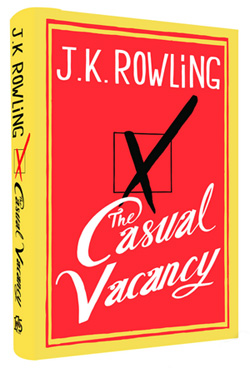You have no items in your cart. Want to get some nice things?
Go shoppingHave a look here at other new releases today.
 J. K. Rowling’s new, long-awaited first book for adults, The Casual Vacancy, has finally been set free into the world today after a watertight security lockdown enforced upon it by the commercial cogs of the publishing industry.
J. K. Rowling’s new, long-awaited first book for adults, The Casual Vacancy, has finally been set free into the world today after a watertight security lockdown enforced upon it by the commercial cogs of the publishing industry.
More than a few stories have been told of the heavy handedness of Rowling’s publishers: the Guardian‘s Decca Aitkenhead and the New Yorker‘s Ian Parker were both granted early access to read the book, but they could only read it under tight supervision in the UK and US offices of Little, Brown, and only after they had agreed to sign, as Aitkenhead puts it, “more legal documents than would typically be involved in buying a house”; Parker reported that the first draft of the non-disclosure agreement he signed had even prohibited him from taking notes. The Independent was also required to sign a non-disclosure agreement before an advanced copy was hand-delivered to them, but refused because the terms were too onerous. Matthew Bell revealed, “Embargoes are normal, but within the legalese, [Literary Editor Katy] Guest found a clause stating that even the existence of the agreement could not be mentioned. A sort of publishing superinjunction.”
The merits of The Casual Vacancy will slowly become more apparent over the next few weeks, months and years, but for the moment, the book seems to be most notorious for showing what Bell described as “the ruthless, bullying side of publishing that has become all too common.” Bell added, “But the real losers in all this are the readers. Two million orders are thought to have been placed worldwide for The Casual Vacancy before its release. Yet nobody knows if it’s any good.”
In the spare, early glimpses we’ve had of Rowling’s new book, Ian Parker’s was mildly encouraging (“The Casual Vacancy will certainly sell, and it may also be liked. […] But whereas Rowling’s shepherding of readers was, in the Harry Potter series, an essential asset, in The Casual Vacancy her firm hand can feel constraining. She leaves little space for the peripheral or the ambiguous; hidden secrets are labelled as hidden secrets, and events are easy to predict.”) and Decca Aitkenhead’s positively ecstatic (“When I tell [J. K Rowling] I loved the book, her arms shoot up in celebration. “Oh my God! I’m so happy! That’s so amazing to hear. Thank you so much! You’ve made me incredibly happy. Oh my God!” Anyone listening would take her for a debut author, meeting her first ever fan.”) But today, upon the book’s release, comes the real reckoning.

London’s bookshops opened earlier than usual this morning to try to catch more sales of Rowling’s new book, but it hasn’t panned out as they had hoped. The Evening Standard reported that “The Harry Potter author’s foray into adult fiction with The Casual Vacancy sold only four copies in the first hour of trading at Foyles’s Charing Cross Road branch, despite it opening an hour early and ordering 1,000 copies to cope with the demand.” But this could be because most people who want to read the book have already ordered a copy, hitting a record 2.6 million in pre-orders.
And what do the reviews have to say? They’ve been flooding in since midnight today and so far they have been mixed, but what they seem to agree on is that The Casual Vacancy is bleak and pitiless, and its characters unlikable. Michiko Kakutani of the New York Times wrote, “Instead of an appreciation for the courage, perseverance, loyalty and sense of duty that people are capable of, we are left with a dismaying sense of human weakness, selfishness and gossipy stupidity.”
What all critics also concur on is that this book is not for children. Laden with scenes of prostitution, rape, domestic violence, drugs, swearing and phrases like “that miraculously unguarded vagina”, will parents have to keep the book at arm’s length from their kids? In her interview with Ian Parker, Rowling defends her decision to write such a book: “There is no part of me that feels that I represented myself as your children’s babysitter or their teacher.” But this is a debate for another day.
The big question is: can The Casual Vacancy live up to the hype? Ever?
The answer seems to be leaning towards “No”, even for critics who enjoyed the book. Understandably, it would be difficult for any act to follow the stratospheric success of the Harry Potter series.
The Mirror Books Editor Henry Sutton has the most affirmative review for Rowling new venture, giving it five stars:
Perhaps the biggest surprise after months of secrecy and false leads is that the world’s best-known, best-loved and best-selling author, is the real deal, more than equipped to tackle the grown-up world.
But other critical reaction has been rather lukewarm, or downright negative.
Theo Thait of the Guardian describes the book as a “solid, traditional and determinedly unadventurous English novel”.
The Casual Vacancy is no masterpiece, but it’s not bad at all: intelligent, workmanlike, and often funny. I could imagine it doing well without any association to the Rowling brand, perhaps creeping into the Richard and Judy Book Club, or being made into a three-part TV serial. The fanbase may find it a bit sour, as it lacks the Harry Potter books’ warmth and charm; all the characters are fairly horrible or suicidally miserable or dead. But the worst you could say about it, really, is that it doesn’t deserve the media frenzy surrounding it.
Allison Pearson of the Telegraph gives it 3 out of 5 stars:
Invariably, the author is best when she is back on home ground, dealing with the teenage characters, their inchoate yearnings and lonely friendships. She gets under the skin of Andrew, Krystal and Fats in a way she fails to with the adults, all of whom are unlikeable or annoying, except Barry Fairbrother. And that’s cheating, because Barry is dead.
The book is at its weakest when it is most angrily political, satirising what JK’s friend, Gordon Brown, calls “bigots”. And the novel pretty much explodes towards the end, losing shape in its fury at the dirty, unfair England that we Muggles have made for ourselves.
David Sexton of the Evening Standard:
The problem for Rowling’s legions of fans will be that she has forgotten to include any basic likeability in her characters here or any real suspense as to what will happen – or deliberately chosen not to supply it, now she no longer needs to do anything other than what she wants. The book is quite punishing to read and the view of human nature it takes is more fundamentally lowering than that of the most cynical French aphorist.
Jan Moir of Mail Online describes the novel as having “more than 500 pages of relentless socialist manifesto masquerading as literature crammed down your throat.” She writes that it won’t live up to expectations…
Not unless you happen to be, like J.K. Rowling herself, the kind of blinkered, Left-leaning demagogue quick to lambast what she perceives to be risible middle-class values, while failing to see that her own lush thickets of dearly held emotions and prejudices are riddled with the same narrow-mindedness she is so quick to detect in others.
Michiko Kakutani of the New York Times:
Unfortunately, the real-life world she has limned in these pages is so willfully banal, so depressingly clichéd that “The Casual Vacancy” is not only disappointing — it’s dull.
It’s as though writing about the real world inhibited Ms. Rowling’s miraculously inventive imagination, and in depriving her of the tension between the mundane and the marvelous constrained her ability to create a two-, never mind three-dimensional tale.
Rowling told the Guardian that “The worst that can happen is that everyone says, ‘Well, that was dreadful, she should have stuck to writing for kids’ and I can take that.” Well, at least one reviewer thought that.
Monica Hesse in the Washington Post:
Throughout ‘The Casual Vacancy’ I could not stop from having one overarching thought, which the devoted fan in me loathes to share since I’m certain it’s the one Rowling is most loath to hear: This book would be a little better if everyone were carrying wands.
So, if you’re a fan of Harry Potter, would you read The Casual Vacancy? If you’re not a fan of Harry Potter, would you read it?
Event Tonight
J. K. Rowling will be at the Southbank Centre tonight to launch The Casual Vacancy. Tickets have, of course, sold out, but you can watch her read live on the Southbank Centre's YouTube channel from 19:30 BST. The live stream will end at 20:25 and will not include the audience Q&A or the book signing.

About Emily Ding
Emily joined Litro in April 2012 as Literary Editor & Web Designer. She made over the website and introduced new developmental and editorial features to strengthen Litro's online presence. She left her position in January 2013, taking a backseat as Contributing Editor to concentrate on writing. She is a freelance journalist with a special interest in travel writing and foreign reporting (with an inclination for Asia and Latin America), and is now based in Malaysia. English is her native language, but she also speaks Mandarin and Spanish, having spent 2007-08 travelling in Central America.





I was apprehensive after loving Harry Potter so much. But JK Rowling is a keeper. This book is excellent. About half way through I felt it might be a tad sluggish, but not for long. It’s intricate and there’s plot after plot. Oh yes, every now and then you might think you’re back with Harry Potter since there’s a school and so many children, but it’s a proper grown up book and I can’t wait for her next.